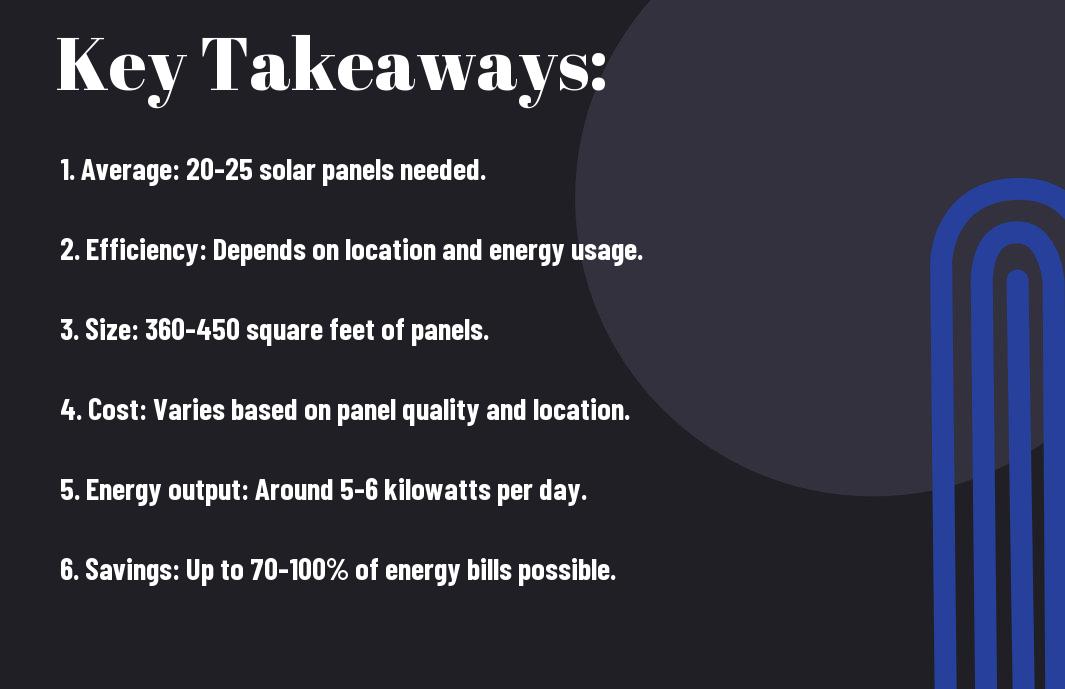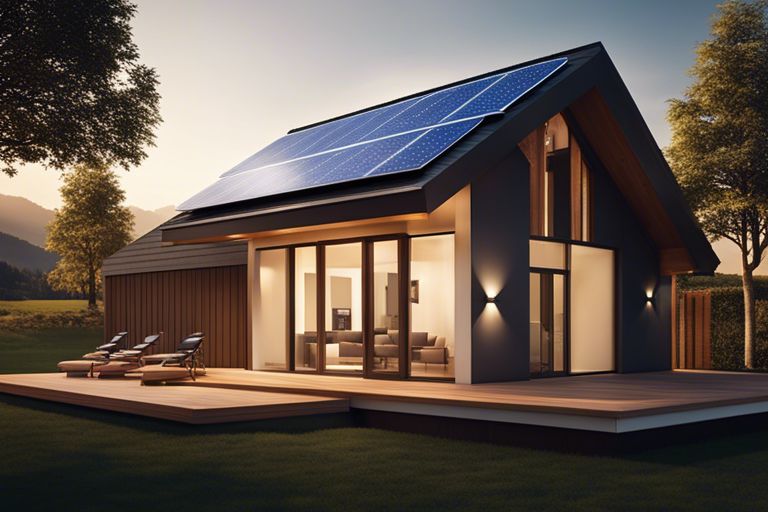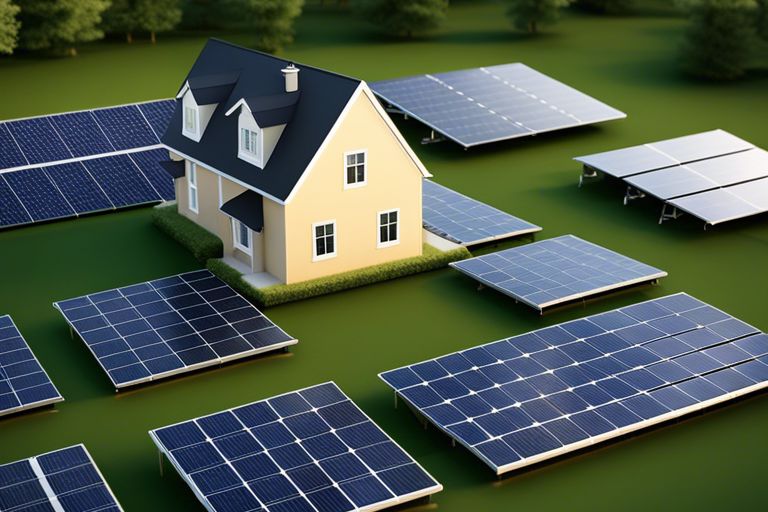It’s time to explore how many solar panels you’ll need to power your 1500 sq ft house. Curious about the calculations? Check out this detailed guide on How Many Solar Panels Do I Need? (2024 Guide) to find out the perfect number of panels to keep your home running efficiently and sustainably.
Key Takeaways:
- Calculate Energy Needs: Determine the energy consumption of the house by accounting for appliances, HVAC systems, and other electronics.
- Size of Solar System: A 1500 sq ft house typically requires a 5 kW solar system to cover its energy needs.
- Consultation: It is advisable to consult with a solar provider to assess the roof space, sun exposure, and other factors to determine the exact number of solar panels needed.

Determining Your Energy Needs
Before you can calculate how many solar panels you need to power a 1500 sq ft house, you need to determine your energy needs. This involves understanding how much energy your household consumes on a daily basis. To do this, you will need to calculate your energy consumption and consider the factors that affect your energy usage.
Calculating Your Energy Consumption
Any accurate estimation of solar panel requirements begins with calculating your energy consumption. Take a look at your recent utility bills to see how many kilowatt-hours (kWh) your household uses per month. By averaging this out, you can get a rough idea of your daily energy consumption. Keep in mind that your energy usage may vary depending on the season, so it’s best to calculate an average to get a more reliable estimate.
Factors Affecting Energy Usage
- Appliances and Electronics: The type and number of appliances and electronics you use in your home can significantly impact your energy consumption.
- Insulation and Home Efficiency: A well-insulated home with energy-efficient appliances will generally require less energy to heat, cool, and power. Knowing how efficient your home is can help you determine your energy needs more accurately.
Energy usage can be influenced by various factors such as the size of your household, the climate in your area, and your daily habits. By understanding how these factors affect your energy consumption, you can make more informed decisions about the number of solar panels you need to power your 1500 sq ft house.
Assessing Your Solar Panel Options
It’s crucial to consider various factors when assessing your solar panel options for powering a 1500 sq ft house. One of the primary decisions you’ll need to make is choosing between monocrystalline and polycrystalline solar panels.
Types of Solar Panels: Monocrystalline vs. Polycrystalline
Assessing different types of solar panels can be overwhelming, but understanding the differences between monocrystalline and polycrystalline panels can help you make an informed decision. Monocrystalline panels are typically more efficient and space-efficient, making them a popular choice for residential solar installations. On the other hand, polycrystalline panels are more affordable but slightly less efficient.
- Monocrystalline panels are more efficient and space-efficient.
- Polycrystalline panels are more affordable but slightly less efficient.
- Monocrystalline panels have a longer lifespan.
- Polycrystalline panels are a budget-friendly option.
- Recognizing your budget and energy needs will help you determine the best option for your home.
Efficiency and Wattage: What Do They Mean?
When considering solar panels, efficiency and wattage are necessary factors to consider. Monocrystalline panels are known for their high efficiency levels, meaning they can generate more electricity in less space compared to polycrystalline panels. Additionally, wattage refers to the amount of electricity a solar panel can produce under ideal conditions. The higher the wattage, the more electricity the panel can generate.
Another crucial aspect to consider is the balance between efficiency and wattage when choosing solar panels for your home. While high efficiency is desirable, you also want to ensure that the panel’s wattage meets your energy requirements. By carefully considering both factors, you can select the most suitable solar panels for your 1500 sq ft house.

Sizing Up Your Solar Panel System
How Many Solar Panels Do You Need?
Keep in mind that the number of solar panels you need for a 1500 sq ft house will depend on factors like your location, energy consumption, and the efficiency of the panels. On average, a 1500 sq ft house will require between 16 to 25 solar panels to cover its energy needs. To get a more accurate estimate, you can use a solar panel calculator or consult with a professional solar installer.
Considering Roof Size and Orientation
For optimal energy production, the size and orientation of your roof are crucial factors to consider when determining the number of solar panels needed. South-facing roofs with little to no shading are ideal for maximizing the sun’s exposure throughout the day. If your roof has limited space or is not well-oriented towards the sun, you may need more efficient solar panels to compensate for the reduced sunlight exposure.
To make the most of your solar panel system, you should also take into account the angle of your roof. A steep angle may be better in snowy climates to allow snow to slide off more easily, while a lower angle might be preferable in sunnier areas to capture more sunlight throughout the year.
Solar panels are a great investment for powering your 1500 sq ft house sustainably while reducing your carbon footprint. By considering factors like the number of panels needed and the optimal roof size and orientation, you can ensure that your solar panel system efficiently meets your energy needs.
Roof Size and Shading Considerations
Measuring Your Roof’s Solar Potential
Unlike conventional roofs, solar panels require an unobstructed area to capture sunlight effectively. It’s vital to assess your roof’s solar potential by determining its size and orientation to maximize energy production. Roofs facing south typically receive the most sunlight throughout the day, making them ideal for solar panel installation. Additionally, analyzing the roof’s pitch and angle can help calculate the optimal positioning for the panels to harness the sun’s energy efficiently.
Dealing with Shading Issues
Size
Ensuring that your roof receives ample sunlight is crucial for the efficiency of your solar panel system. Shading from nearby trees, buildings, or structures can significantly impact the energy output of your panels. You can mitigate shading issues by trimming trees, relocating structures, or opting for microinverters that manage shade impacts on individual panels, enabling your system to perform optimally even in partially shaded areas.
To maximize the solar potential of your 1500 sq ft house, it’s vital to consider your roof’s size and shading conditions. By carefully assessing these factors, you can determine the number of solar panels needed to power your home efficiently. Do not forget, a well-positioned and shade-free roof can significantly enhance the performance and longevity of your solar panel system.
Local Building Codes and Regulations
Permits and Inspections: What to Expect
What many people don’t realize is that installing solar panels on your roof requires permits and inspections to ensure everything is up to code. Before you start the process, you’ll need to check with your local government to find out what specific permits are required in your area. Typically, you will need permits for both the installation of the solar panels and the electrical work involved.
During the installation process, inspectors will need to visit your property to check that the panels are installed correctly and meet safety standards. Don’t worry, this is a standard procedure to make sure everything is in order and that your solar panel system is safe and efficient.
Compliance with Local Ordinances
Any changes or additions to your home, including installing solar panels, must comply with local ordinances and regulations. These rules are in place to ensure that your neighborhood maintains a certain aesthetic and that all structures meet safety standards. It’s important to be aware of these regulations before you start the process of installing solar panels on your home.
The last thing you want is to go through all the trouble and expense of installing solar panels, only to find out that you are in violation of a local ordinance. By familiarizing yourself with the rules and regulations upfront, you can save yourself a lot of headaches down the road.

Budgeting for Your Solar Panel System
Upfront Costs: What to Expect
Panel installation for a 1500 sq ft house can be a significant investment, so it’s imperative to plan your budget carefully. The upfront costs typically include the price of solar panels, inverters, mounting equipment, installation labor, and permitting fees. On average, you can expect to pay between $15,000 to $25,000 for a solar panel system that can power a 1500 sq ft house. Keep in mind that prices may vary based on the quality of the equipment, the complexity of the installation, and your location.
Incentives and Rebates: Taking Advantage
System incentives and rebates can help offset the upfront costs of installing a solar panel system for your home. Depending on where you live, you may be eligible for federal, state, or local incentives that can significantly reduce the overall cost of your solar panel system. These incentives can come in the form of tax credits, rebates, or performance-based incentives, making solar energy more affordable and accessible for homeowners.
By taking advantage of these incentives and rebates, you can make your solar panel system more cost-effective in the long run. Be sure to research what incentives are available in your area and factor them into your budgeting process.
Conclusion
As a reminder, the number of solar panels needed to power a 1500 sq ft house will depend on various factors such as location, sunlight exposure, energy consumption patterns, and the efficiency of the solar panels. While it is difficult to give an exact number without specific details, a rough estimate would be around 20-25 solar panels for a 1500 sq ft house. It is recommended to consult with a solar energy expert to get a more accurate assessment tailored to your individual needs.
Considering the potential cost savings, environmental benefits, and the growing availability of solar energy technology, investing in solar panels for your home could be a wise decision. Not only can you reduce your carbon footprint, but you can also enjoy lower energy bills and potentially even generate extra income by selling excess energy back to the grid. So, if you’re considering going solar for your 1500 sq ft house, do your research, crunch the numbers, and take the leap into renewable energy!
FAQ
Q: How many solar panels are needed to power a 1500 sq ft house?
A: The number of solar panels needed to power a 1500 sq ft house can vary depending on factors such as the location, amount of sunlight received, energy consumption of the household, and efficiency of the solar panels. On average, a 1500 sq ft house might require approximately 20-30 solar panels to cover its energy needs.
Q: How can I calculate the number of solar panels needed for my 1500 sq ft house?
A: To calculate the number of solar panels needed for your 1500 sq ft house, you can start by determining your average daily energy consumption in kilowatt-hours (kWh). Then, consider the average sunlight hours in your area to estimate the solar energy production per panel. Divide your daily energy consumption by the energy production per panel to find out how many panels are needed.
Q: What are some factors to consider when determining the number of solar panels for a 1500 sq ft house?
A: When deciding on the number of solar panels for a 1500 sq ft house, it’s important to consider factors such as the orientation and tilt of the roof, shading from trees or nearby buildings, energy efficiency measures in the house, quality and efficiency of the solar panels, as well as any local regulations or incentives that may impact the installation of solar panels.
